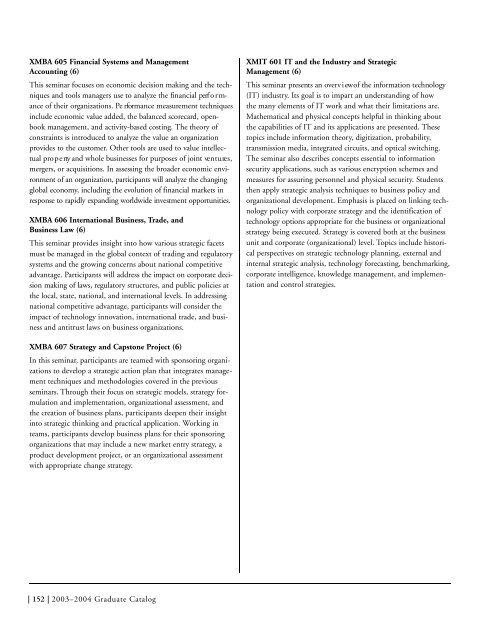A+B. Intro_SJ.1 - University of Maryland University College
A+B. Intro_SJ.1 - University of Maryland University College
A+B. Intro_SJ.1 - University of Maryland University College
Create successful ePaper yourself
Turn your PDF publications into a flip-book with our unique Google optimized e-Paper software.
XMBA 605 Financial Systems and Management<br />
Accounting (6)<br />
This seminar focuses on economic decision making and the techniques<br />
and tools managers use to analyze the financial perf o r m-<br />
ance <strong>of</strong> their organizations. Pe rformance measurement techniques<br />
include economic value added, the balanced score c a rd, openbook<br />
management, and activity-based costing. The theory <strong>of</strong><br />
constraints is introduced to analyze the value an organization<br />
p rovides to the customer. Other tools are used to value intellectual<br />
p ro p e rty and whole businesses for purposes <strong>of</strong> joint ve n t u re s ,<br />
mergers, or acquisitions. In assessing the broader economic environment<br />
<strong>of</strong> an organization, participants will analyze the changing<br />
global economy, including the evolution <strong>of</strong> financial markets in<br />
response to rapidly expanding worldwide investment opport u n i t i e s .<br />
XMBA 606 International Business, Trade, and<br />
Business Law (6)<br />
This seminar provides insight into how various strategic facets<br />
must be managed in the global context <strong>of</strong> trading and regulatory<br />
systems and the growing concerns about national competitive<br />
advantage. Participants will address the impact on corporate decision<br />
making <strong>of</strong> laws, re g u l a t o ry structures, and public policies at<br />
the local, state, national, and international levels. In addressing<br />
national competitive advantage, participants will consider the<br />
impact <strong>of</strong> technology innovation, international trade, and business<br />
and antitrust laws on business organizations.<br />
XMIT 601 IT and the Industry and Strategic<br />
Management (6)<br />
This seminar presents an ove rv i ew <strong>of</strong> the information technology<br />
(IT) industry. Its goal is to impart an understanding <strong>of</strong> how<br />
the many elements <strong>of</strong> IT work and what their limitations are.<br />
Mathematical and physical concepts helpful in thinking about<br />
the capabilities <strong>of</strong> IT and its applications are presented. These<br />
topics include information theory, digitization, probability,<br />
transmission media, integrated circuits, and optical switching.<br />
The seminar also describes concepts essential to information<br />
security applications, such as various encryption schemes and<br />
measures for assuring personnel and physical security. Students<br />
then apply strategic analysis techniques to business policy and<br />
organizational development. Emphasis is placed on linking technology<br />
policy with corporate strategy and the identification <strong>of</strong><br />
technology options appropriate for the business or organizational<br />
strategy being executed. Strategy is covered both at the business<br />
unit and corporate (organizational) level. Topics include historical<br />
perspectives on strategic technology planning, external and<br />
internal strategic analysis, technology forecasting, benchmarking,<br />
corporate intelligence, knowledge management, and implementation<br />
and control strategies.<br />
XMBA 607 Strategy and Capstone Project (6)<br />
In this seminar, participants are teamed with sponsoring organizations<br />
to develop a strategic action plan that integrates management<br />
techniques and methodologies covered in the previous<br />
seminars. Through their focus on strategic models, strategy formulation<br />
and implementation, organizational assessment, and<br />
the creation <strong>of</strong> business plans, participants deepen their insight<br />
into strategic thinking and practical application. Working in<br />
teams, participants develop business plans for their sponsoring<br />
organizations that may include a new market entry strategy, a<br />
product development project, or an organizational assessment<br />
with appropriate change strategy.<br />
| 152 | 2003–2004 Graduate Catalog

















